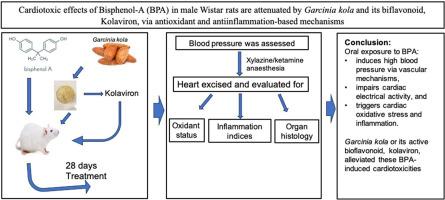双酚a对雄性Wistar大鼠的心脏毒性作用通过抗氧化和抗炎机制被藤黄菌及其双黄酮可拉维铁减弱
IF 3
3区 医学
Q1 INTEGRATIVE & COMPLEMENTARY MEDICINE
Journal of Traditional and Complementary Medicine
Pub Date : 2025-10-01
DOI:10.1016/j.jtcme.2024.08.004
引用次数: 0
摘要
心脏,由于其高能量代谢和活性氧产生率,是氧化应激相关损伤的目标。因此,双酚a (BPA)等环境毒物,通过氧化和亚硝酸盐应激相关机制发挥病理作用,可能针对心脏产生有害影响。因此,本研究旨在探讨两种天然抗氧化剂,Garcinia kola (GK)和kolaviron对bpa诱导的雄性Wistar大鼠心功能障碍和毒性的影响。方法56只动物随机分为7组,口服治疗28d;I组(对照组)和II组(试验组)分别给予蒸馏水(1.5 mL/kg)和玉米油(1.5 mL/kg)。iii ~ v组分别给予双酚a (50 mg/kg)、双酚a + GK (200 mg/kg)、双酚a +可拉维铁(200 m/kg), vi ~ vii组分别给予双酚a和可拉维铁。在麻醉状态下,取心脏样本,分别分析氧化应激状态、炎症标志物和组织学。结果bpa暴露大鼠出现心脏功能障碍,表现为收缩压升高、心脏炎症指标升高、心脏抗氧化剂降低和结构畸变。用GK或可拉维铁治疗BPA暴露的动物在不同程度上减轻了这些功能障碍的发展,而在没有BPA暴露的情况下,单独使用GK或可拉维铁治疗显示出显著的抗氧化和抗炎潜力。结论栀子果及其双黄酮可拉维铁通过增强抗氧化防御和阻断炎症介导的机制,阻止双酚a诱导的心功能障碍和毒性的发生。本文章由计算机程序翻译,如有差异,请以英文原文为准。

Cardiotoxic effects of Bisphenol-A in male Wistar rats are attenuated by Garcinia kola and its biflavonoid, kolaviron, via antioxidant and antiinflammation-based mechanisms
Introduction
The heart, due to its high energetic metabolic and reactive oxygen production rate, is a target for oxidative stress-related injuries. Therefore, environmental toxicants such as Bisphenol-A (BPA), that exert pathologies through oxidative and nitrite stress-related mechanism may target the heart for their deleterious effects. This study was therefore designed to investigate the effect of two naturally occurring antioxidants, Garcinia kola (GK) and kolaviron, on BPA-induced cardiac dysfunction and toxicity in male Wistar rats.
Methods
Fifty-six animals were divided into 7equal groups and treated orally for 28days as follows; groups I(control) and II(vehicle) received distilled water(1.5 mL/kg) and corn oil(1.5 mL/kg) respectively. Animals in groups III-V received BPA (50 mg/kg) only, BPA + GK (200 mg/kg), BPA + kolaviron (200 m/kg) respectively, while animals in groups VI-VII received GK and kolaviron only, respectively. Thereafter, blood pressure and electrocardiogram were evaluated in each group and under anesthesia, cardiac samples were excised and analyzed for oxidative stress status, inflammatory markers and histology, respectively.
Results
BPA-only exposed rats exhibited cardiac dysfunction manifested by elevated systolic blood pressure and cardiac inflammatory markers, reduced cardiac antioxidants and distorted structural aberrations. Treatment of BPA exposed animals with either GK or kolaviron mitigated the development of these dysfunctions in varying degrees, while treatment of either GK or kolaviron alone in the absence of BPA exposure showed significant antioxidant and anti-inflammatory potentials.
Conclusion
These results suggests that Garcinia kola and its biflavonoid, kolaviron, prevents the development of bisphenol-A induced cardiac dysfunction and toxicity by potentiating antioxidant defence and impeding inflammation mediated mechanism.
求助全文
通过发布文献求助,成功后即可免费获取论文全文。
去求助
来源期刊

Journal of Traditional and Complementary Medicine
Medicine-Complementary and Alternative Medicine
CiteScore
9.30
自引率
6.70%
发文量
78
审稿时长
66 days
期刊介绍:
eJTCM is committed to publish research providing the biological and clinical grounds for using Traditional and Complementary Medical treatments as well as studies that demonstrate the pathophysiological and molecular/biochemical bases supporting the effectiveness of such treatments. Review articles are by invitation only.
eJTCM is receiving an increasing amount of submission, and we need to adopt more stringent criteria to select the articles that can be considered for peer review. Note that eJTCM is striving to increase the quality and medical relevance of the publications.
 求助内容:
求助内容: 应助结果提醒方式:
应助结果提醒方式:


